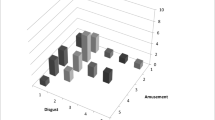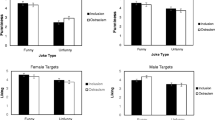Abstract
Using humor, being funny, and having a good sense of humor are often reported as desirable qualities. However, little attention has been paid to possible differences in responses to humor reflecting affiliative as opposed to aggressive motivations. In evaluating a stranger, when examples of affiliative and aggressive humor were presented as the stranger’s preferred humor, aggressive humor led to more negative impressions (Study 1). To further explore the impact of humor reflecting affiliative versus aggressive motivations, participants were exposed to equally funny videotapes representing the two humor styles (Study 2). Women’s reported affective experiences varied across the humor styles, but men’s did not. Women and men rated the affiliative video as being more positive than negative, but no differences in the qualities were found for the aggressive video. Results across the two studies demonstrate the importance of considering not just the funniness of humor efforts, but also the social motives conveyed by the humor. Given the complexity of responses to humor, additional research is needed to better understand the contexts within which being funny might have social benefits versus social costs.
Similar content being viewed by others
Notes
Analyzing the ratings of social desirability and undesirability separately yielded the same results; only the humor style main effect was significant in each case.
A preliminary report on these results was presented in a poster at the International Society for Humor Studies Conference, College of William and Mary, July, 2013.
References
Blanchette, I., & Richards, A. (2010). The influence of affect on higher level cognition: A review of research on interpretation, judgment, decision making and reasoning. Cognition and Emotion, 24(4), 561–595. doi:10.1080/02699930903132496.
Bressler, E. R., & Balshine, S. (2006). The influence of humor on desirability. Evolution and Human Behavior, 27(1), 29–39. doi:10.1016/j.evolhumbehav.2005.06.002.
Bressler, E. R., Martin, R. A., & Balshine, S. (2006). Production and appreciation of humor as sexually selected traits. Evolution and Human Behavior, 27(2), 121–130. doi:10.1016/j.evolhumbehav.2005.09.001.
Buss, D. M. (1988). The evolution of human intrasexual competition: Tactics of mate attraction. Journal of Personality and Social Psychology, 54(4), 616–628. doi:10.1037/0022-3514.54.4.616.
Campbell, Lorne, Martin, Rod A., & Ward, Jennie R. (2008). An observational study of humor use while resolving conflict in dating couples. Personal Relationships, 15(1), 41–55. doi:10.1111/j.1475-6811.2007.00183.x.
Cann, A., & Calhoun, L. G. (2001). Perceived personality associations with differences in sense of humor: Stereotypes of hypothetical others with high or low senses of humor. Humor: International Journal of Humor Research, 14(2), 117–130. doi:10.1515/humr.14.2.117.
Cann, A., Calhoun, L. G., & Nance, J. T. (2000). Exposure to humor before and after an unpleasant stimulus: Humor as a preventative or a cure. Humor: International Journal of Humor Research, 13(2), 177–191. doi:10.1515/humr.2000.13.2.177.
Cann, A., & Matson, C. (2014). Sense of humor and social desirability: Understanding how humor styles are perceived. Personality and Individual Differences, 66, 176–180. doi:10.1016/j.paid.2014.03.029.
Cann, A., Zapata, C. L., & Davis, H. B. (2011). Humor styles and relationship satisfaction in dating couples: Perceived versus self-reported humor styles as predictors of satisfaction. Humor: International Journal of Humor Research, 24(1), 1–20. doi:10.1515/humr.2011.001.
Craik, K. H., Lampert, M. D., & Nelson, A. J. (1996). Sense of humor and styles of everyday humorous conduct. Humor: International Journal of Humor Research, 9, 273–302.
Craik, K. H., & Ware, A. P. (1998). Humor and personality in everyday life. In W. Ruch (Ed.), The sense of humor: Explorations of a personality characteristic (pp. 63–98). Berlin: Walter de Gruyter & Co.
DiDonato, T. E., Bedminster, M. C., & Machel, J. J. (2013). My funny valentine: How humor styles affect romantic interest. Personal Relationships, 20(2), 374–390. doi:10.1111/j.1475-6811.2012.01410.x.
Ford, T. E., Ford, B. L., Boxer, C. F., & Armstrong, J. (2012). Effect of humor on state anxiety and math performance. Humor: International Journal of Humor Research, 25(1), 59–74. doi:10.1515/humor-2012-000.
Foster, P. S., Webster, D. G., & Williamson, J. (2002). The psychophysiological differentiation of actual, imagined, and recollected mirth. Imagination, Cognition and Personality, 22(2), 163–180.
Greengross, G., & Miller, G. F. (2008). Dissing oneself versus dissing rivals: Effects of status, personality, and sex on the short-term and long-term attractiveness of self-deprecating and other-deprecating humor. Evolutionary Psychology, 6(3), 393–408.
Greengross, G., & Miller, G. (2011). Humor ability reveals intelligence, predicts mating success, and is higher in males. Intelligence, 39(4), 188–192. doi:10.1016/j.intell.2011.03.006.
Gruner, C. R. (1997). The game of humor: A comprehensive theory of why we laugh. Piscataway, NJ US: Transaction Publishers.
Guéguen, N. (2010). Men’s sense of humor and women’s responses to courtship solicitations: An experimental field study. Psychological Reports, 107(1), 145–156. doi:10.2466/07.17.PR0.107.4.145-156.
Hall, J. A. (2011). Is it something I said? Sense of humor and partner embarrassment. Journal of Social and Personal Relationships, 28(3), 383–405. doi:10.1177/0265407510384422.
Herzog, T. R., & Bush, B. A. (1994). The prediction of preference for sick humor. Humor: International Journal of Humor Research, 7(4), 323–340.
Kruger, D. J. (2006). Male facial masculinity influences attributions of personality and reproductive strategy. Personal Relationships, 13, 451–463.
Kuiper, N. A. (2012). Humor and resiliency: Towards a process model of coping and growth. Europe’s Journal of Psychology, 8(3), 475–491. doi:10.5964/ejop.v8i3.464.
Lippa, R. A. (2007). The preferred traits of mates in a cross-national study of heterosexual and homosexual men and women: An examination of biological and cultural influences. Archives of Sexual Behavior, 36(2), 193–208. doi:10.1007/s10508-006-9151-2.
Martin, R. A. (2007). The psychology of humor: An integrative approach. Amsterdam Netherlands: Elsevier.
Martin, R. A., Puhlik-Doris, P., Larsen, G., Gray, J., & Weir, K. (2003). Individual differences in uses of humor and their relation to psychological well-being: Development of the humor styles questionnaire. Journal of Research in Personality, 37(1), 48–75. doi:10.1016/S0092-6566(02)00534-2.
Miller, G. (2000). The mating mind: How sexual choice shaped the evolution of human nature. New York, NY US: Doubleday & Co.
Mobbs, D., Greicius, M. D., Abdel-Azim, E., Menon, V., & Reiss, A. L. (2003). Humor modulates the mesolimbic reward centers. Neuron, 40, 1041–1048. doi:10.1016/S0896-6273(03)00751-7.
Polimeni, J., & Reiss, J. P. (2006). The first joke: Exploring the evolutionary origins of humor. Evolutionary Psychology, 4, 347–366.
Robbins, T. L., & DeNisi, A. S. (1994). A closer look at interpersonal affect as a distinct influence on cognitive processing in performance evaluations. Journal of Applied Psychology, 79(3), 341.
Samson, A. C., & Gross, J. J. (2012). Humour as emotion regulation: The differential consequences of negative versus positive humour. Cognition and Emotion, 26(2), 375–384. doi:10.1080/02699931.2011.585069.
Saroglou, V., & Anciaux, L. (2004). Liking sick humor: Coping styles and religion as predictors. Humor: International Journal of Humor Research, 17(3), 257–278.
Saroglou, V., Lacour, C., & Demeure, M. (2010). Bad humor, bad marriage: Humor styles in divorced and married couples. Europe’s Journal of Psychology, 6, 94–121.
Szabo, A., Ainsworth, S. E., & Danks, P. K. (2005). Experimental comparison of the psychological benefits of aerobic exercise, humor, and music. Humor: International Journal of Humor Research, 18(3), 235–246. doi:10.1515/humr.2005.18.3.235.
Weisfeld, G. E. (1993). The adaptive value of humor and laughter. Ethology and Sociobiology, 14(2), 141–169.
Weisfield, G. E., Nowak, N. T., Lacas, T., Weisfeld, C. C., Imamoğlu, E. O., Butovskaya, M., & Parkhill, M. R. (2011). Do women seek humorousness in men because it signals intelligence? A cross-cultural test. Humor: International Journal of Humor Research, 24(4), 435–462. doi:10.1515/HUMR.2011.025.
Wilson, E. O. (2012). The social conquest of earth. New York: Livermore Publishing.
Zillman, D. (1983). Disparagement humor. In P. E. McGhee & J. H. Goldstein (Eds.), Handbook of humor research (Vol. 1, pp. 85–108). New York: Springer.
Ziv, A. (1988). Humor’s role in married life. Humor: International Journal of Humor Research, 1(3), 223–229. doi:10.1515/humr.1988.1.3.223.
Author information
Authors and Affiliations
Corresponding author
Rights and permissions
About this article
Cite this article
Cann, A., Cann, A.T. & Jordan, J.A. Understanding the effects of exposure to humor expressing affiliative and aggressive motivations. Motiv Emot 40, 258–267 (2016). https://doi.org/10.1007/s11031-015-9524-8
Published:
Issue Date:
DOI: https://doi.org/10.1007/s11031-015-9524-8




